-

新人教版高中英语必修2Unit 4 History and Traditions-Listening&Speaking&Talking教案一
This unit is about history and traditions. From the opening page, we can know that this unit will introduce the history and traditions around the world. As Marcus Garvey says “A people without the knowledge of their past history, origin and culture is like a tree without roots”, it is important for students to realize the importance and value of knowing the history and traditions and their further meanings. And this part ( listening and speaking ) is divided into two parts: Part A---share views on historic sites, Part B ---talk about a visit to a historic tourist destination. By talking with a foreigner, the speakers introduce the historic attractions and their cultures. Part A is that William, a British student, who was going to visit the Confucius Temple and a Chinese student, Xiao Kong, who was going to the Confucius Temple to meet with the members of the research group, went together and exchanged their views on the Confucius Temple, Confucius, Confucius' descendants and Confucius' educational thoughts. Part B is a conversation between Xiao Yan, a youth hostel receptionist and Paul, a backpacker about the feelings and experience after visiting the Chinese famous tourist attraction Pingyao.1. Guide students to understand the content of listening texts in terms of the whole and key details; 2. Cultivate students' ability to guess the meaning of words in listening; discuss with their peers how to talk about historic spots and great person.3. Instruct students to use functional sentences of showing one’s excitement, surprise and disappointment.1. Guide students to understand the content of listening texts in terms of the whole and key details; 2. Cultivate students' ability to discuss with their peers the related topics.3. Enable students to use the functional items of showing one’s excitement, surprise and disappointment.

新人教版高中英语必修2Unit 4 History and Traditions-Discovering Useful Structure教案二
This teaching period mainly deals with grammar: The past participle is used as attributive and objective complement.1. Guide students to review the basic usages of the past participle used as attributive and objective complement.2. Lead students to learn to use some special cases concerning the past participle used as attributive and objective complement flexibly.3. Strengthen students’ great interest in grammar learning.1. Help students to appreciate the function of the past participle used as attributive and objective complement.2. Instruct students to write essays using the past participle used as attributive and objective complement.Step1:温故而知新。Analyze the underlined phrases and then sum up the common usages of the past participles.1.(教材P41)They had castles built(build) all around England, and made changes to the legal system.2.(教材P42)They use the same flag, known(know) as the Union Jack,...3.(教材P42)Judy and I had our car parked(park) in an underground car park near Trafalgar Square, where we could get our car battery charged(charge).Common points: f the past participle used as attributive and objective complement.Step 2:过去分词作定语时的意义1.及物动词的过去分词作定语,在语态上表示被动;在时间上,常表示动作已经发生或完成,有时也不表示时间性。Our teacher watched us doing the experiment and gave us a satisfied smile at last.我们的老师看着我们做实验,最后给了我们一个满意的微笑。The plan put forward at the meeting will be carried out soon.会上提出的计划将很快被执行。2.不及物动词的过去分词作定语,它不表示被动意义,只强调动作完成。Many little kids like gathering fallen leaves in the yard.

新人教版高中英语必修2Unit 4 History and Traditions-Reading and Thinking教案一
Features of languages1.Finally, in the 20th century, the southern part of Ireland broke away from the UK, which resulted in the full name we have today: the United Kingdom of Great Britain and Northern Ireland.该句是一个复合句。该句主句为:the southern part of Ireland broke away from the UK;which resulted in the full name we have today为which引导的定语从句代指前面整句话的内容,we have today为定语从句修饰先行词name。译文:最后,在20世纪,爱尔兰南部脱离英国,这导致了我们今天有的英国的全名:大不列颠及北爱尔兰联合王国。2.Almost everywhere you go in the UK, you will be surrounded by evidence of four different groups of people who took over at different times throughout history.该句是一个复合句。该句主句为:you will be surrounded by evidence of four different groups of people;其中Almost everywhere you go in the UK为让步状语从句; who took over at different times throughout history为定语从句修饰先行词people。译文:几乎无论你走到英国的任何地方,你都会发现历史上有四种不同的人在不同的时期统治过英国。3.The capital city London is a great place to start, as it is an ancient port city that has a history dating all the way back to Roman times.该句是一个复合句。该句主句为:The capital city London is a great place to start; as it is an ancient port city that has a history dating all the way back to Roman times.为原因状语从句;dating all the way back to Roman times为现在分词短语作定语修饰history。

新人教版高中英语必修2Unit 5 Music-Discovering Useful Structures教案二
4. When he got absorbed in his world of music, he felt as if he could “see” the beauty of the world around him, like he had in his previous life.P·P as adverbial: _________________________________________________________________.Function: _______________________________________________________________________.Step 5 Solid Complete the passage with the words in brackets in their correct forms.Well known as a successful band, the Impact members show quite a few striking qualities. They never ever give up. When _____________(question) by the media, they are not _____________(discourage) and practise even harder. They are improving themselves by attending several master training class. They are united. _____________(fill with) team spirit, they act as a whole, always aiming for glory. Step 6 Difference and similarity from -ingObserve the following examples.1. He went out, shutting the door behind him.=He went out, ________________________________________________________.2. Not knowing what to do, he went to his parents for help.=__________________________________________, he went to his parents for help.Similarity: _______________________________________________________________________________________________________________________________________________________.Difference : _______________________________________________________________________________________________________________________________________________________.Step Practice1. ________ in a hurry, this article was not so good. 因为写得匆忙, 这篇文章不是很好。2. ________ carefully, he found something he hadn’t known before. 他仔细读书时, 发现了一些从前不知道的东西。3. ________ why he did it, the monitor said it was his duty. 当被问及他为什么要这么做时, 班长说这是他的职责

新人教版高中英语必修2Unit 5 Music-Listening and Speaking教案
This lesson is about music. Students can classify the types of music through the instruments and its sound and can talk about their preferences about music, even join some activities and play a role in them according to their musical talents. On the basis, they are guided to use the languages to express their preferences and some plosive sounds and their rules.1. Classify the music types through the instruments and its sound.2. Listen and understand what the speakers’ preferences are and the reasons; talk about their own preferences and give their own reasons, using these sentences: “What kind of music do you like? And why? “ “Because it makes/gives me energy/peaceful.../touches my heart...”.3. Learn some plosives and the rules.4. Join some activities and play a role in them according to the talents. 1. Listen and understand what the speakers’ preferences are and the reasons;2. talk about their own preferences and give their own reasons, using these sentences: “What kind of music do you like? And why? “ “Because it makes/gives me energy/peaceful.../touches my heart...”.3. Learn some plosives and incomplete plosives and its rules.Step 1 Lead inPoint at the pictures on P50 and ask Q1: What are the people doing in the pictures below?Q2: What kind of music they are?Then play the MP3s one by oneStep 2 ListeningTask 1: A reporter from the school newspaper is interviewing students about music. Listen to the interviews. Draw lines between the words to make complete sentences. Some words will not be used.

新人教版高中英语必修2Unit 5 Music-Reading for Writing教案二
The Internet celebrity Gao Yifeng. Years ago, he owned 5 companies and the staffs over 1,000, but during the economy crisis, he became nothing but debt. He was so worried that his hair became white overnight. There was a time when he wanted to killed himself. But after listening to the song Start Over by Liu Huan, he decided to cheer himself up. He started a steamed bun shop and gradually became a national chain shops. Now he became successful again.Walter Haddon said, “Music is the medicine of a troubled mind.” Music contains such a pleasant and inspiring force. Music gave him courage and bravery. When he listened to the song, it made his spirit fly like a kite in the wind. Music gave him strength and brought him relief. It was the rock I leant on to become strong and to get through those hard times. I hope none of us have to go through the same kind of suffering that he did. At the same time, we all go through various periods when we feel sad or alone. During those times, music can help us in the same way that it helped him. I hope we all will somehow begin to treasure music and make it a part of our life. Thank you for your listening !5.Revise your writing each other.Does he/she explain how music has changed his/her/someone else’s life?Are some of the rhetorical devices included and used properly ?Does he/she talk about how music makes him/her/someone feel?Is the first word in each sentences capitalised?Does he/she use correct punctuation ?
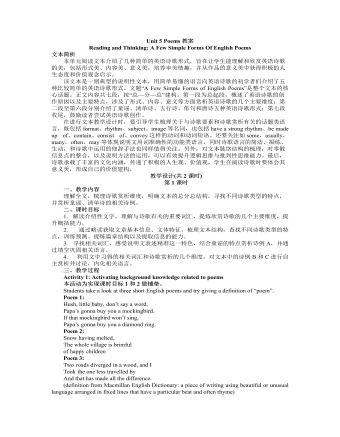
新人教版高中英语选修3Unit 5 Poems教案
本单元阅读文本介绍了几种简单的英语诗歌形式,旨在让学生能理解和欣赏英语诗歌的美,包括形式美、内容美、意义美,培养审美情趣,并从作品的意义美中获得积极的人生态度和价值观念启示。 该文本是一则典型的说明性文本,用简单易懂的语言向英语诗歌的初学者们介绍了五种比较简单的英语诗歌形式。文题“A Few Simple Forms of English Poems”是整个文本的核心话题。正文内容共七段,按“总—分—总”建构。第一段为总起段,概述了英语诗歌的创作原因以及主要特点,涉及了形式、内容、意义等方面赏析英语诗歌的几个主要维度;第二段至第六段分别介绍了童谣、清单诗、五行诗、俳句和唐诗五种英语诗歌形式;第七段收尾,鼓励读者尝试英语诗歌创作。 在进行文本教学设计时,要引导学生梳理关于与诗歌要素和诗歌赏析有关的话题类语言,既包括format、rhythm、subject、image等名词,也包括have a strong rhythm、be made up of、contain、consist of、convey这样的动词和动词短语。
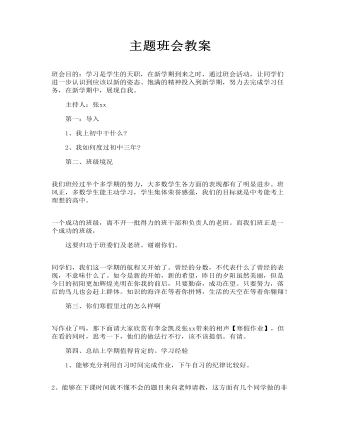
主题班会教案
第二、班级境况 我们班经过半个多学期的努力,大多数学生各方面的表现都有了明显进步。班风正,多数学生能主动学习,学生集体荣誉感强,我们的目标就是中考能考上理想的高中。 一个成功的班级,离不开一批得力的班干部和负责人的老班。而我们班正是一个成功的班级, 这要归功于班委们及老班。谢谢你们。 同学们,我们这一学期的航程又开始了。曾经的分数,不代表什么了曾经的表现,不意味什么了。如今是新的开始,新的希望,昨日的夕阳虽然美丽,但是今日的初阳更加辉煌光明在你我的前后,只要勤奋,成功在望。只要努力,落后的鸟儿也会赶上群体。知识的海洋在等着你拼博,生活的天空在等着你翱翔!
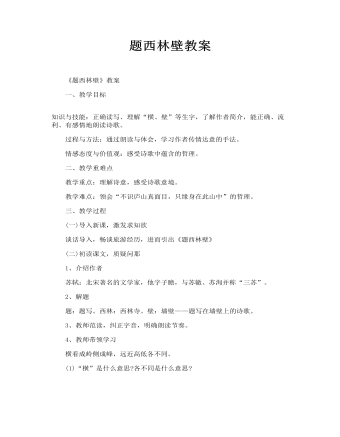
题西林壁教案
二、教学重难点 教学重点:理解诗意,感受诗歌意境。 教学难点:领会“不识庐山真面目,只缘身在此山中”的哲理。 三、教学过程 (一)导入新课,激发求知欲 谈话导入,畅谈旅游经历,进而引出《题西林壁》
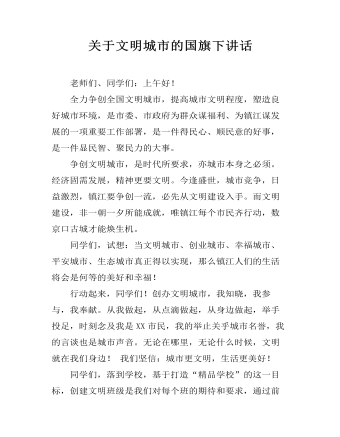
关于文明城市的国旗下讲话
老师们、同学们:上午好!全力争创全国文明城市,提高城市文明程度,塑造良好城市环境,是市委、市政府为群众谋福利、为镇江谋发展的一项重要工作部署,是一件得民心、顺民意的好事,是一件显民智、聚民力的大事。争创文明城市,是时代所要求,亦城市本身之必须。经济固需发展,精神更要文明。今逢盛世,城市竞争,日益激烈,镇江要争创一流,必先从文明建设入手。而文明建设,非一朝一夕所能成就,唯镇江每个市民齐行动,数京口古城才能焕生机。同学们,试想:当文明城市、创业城市、幸福城市、平安城市、生态城市真正得以实现,那么镇江人们的生活将会是何等的美好和幸福!

金昌市开展文明风尚行动综述
9月24日7点30分,2023全国马拉松锦标赛(第六站)暨金昌半程马拉松赛鸣枪开跑,赛道沿途有身着汉服的学生、老年艺术协会志愿者、市直单位、市民自发组成的啦啦队,秩序井然地为选手加油鼓劲,每隔一公里还有“火星1号“基地的“宇航员”挥手鼓劲。这样的暖心行为、友好互动还有不少,其中一些更是在网上引发热议。很多网友表示:“点赞这样的比赛文化”“充满正能量”今年,我市举办了金昌半程马拉松赛、千车万人·“火星”穿越镍都金昌·“山猫”狂欢文旅活动等大型赛事,金昌市民文明观赛、加油助威,展示了良好的素质形象。金昌正不断筑牢“文明有礼”好家园,强健文明实践村社”肌体”。“婆媳互夸”“逢六上街”等有礼文化地标和文明实践品牌点亮日常,基层文明实践百花齐放。文明无形亦有形,城乡文明的建设,全民素质的提升,让金昌百姓愈加深刻地体会到“在金昌感受文明有礼”的真实。
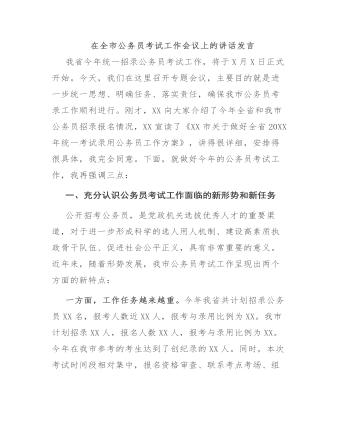
在全市公务员考试工作会议上的讲话发言
另一方面,社会关注度越来越高。公务员考录工作直接面向社会、面向群众、面向人才群体,无论是上级部门、用人单位还是考生,都对考试的公平性和公正性高度关注。随着考生的维权意识不断增强,通过新闻媒体、网络媒体反应问题的渠道逐步增多,我们工作中任何一点小的失误都可能影响考生的终生命运,同时会对政府部门的权威性和社会公信力造成不良影响。这都对公务员考试工作提出新的要求和新的挑战。
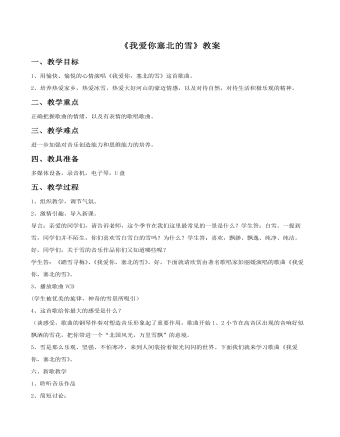
《我爱你塞北的雪》教案
教学过程1、组织教学,调节气氛。2、激情引趣、导入新课。导言:亲爱的同学们,请告诉老师,这个季节在我们这里最常见的一景是什么?学生答:白雪。一提到雪,同学们并不陌生,你们喜欢雪白雪白的雪吗?为什么?学生答:喜欢,飘渺、飘逸、纯净、纯洁。好,同学们,关于雪的音乐作品你们又知道哪些呢?学生答:《踏雪寻梅》、《我爱你,塞北的雪》。好,下面就请欣赏由著名歌唱家彭丽媛演唱的歌曲《我爱你,塞北的雪》。3、播放歌曲VCD(学生被优美的旋律,神奇的雪景所吸引)4、这首歌给你最大的感受是什么?(谈感受,歌曲的钢琴伴奏对塑造音乐形象起了重要作用,歌曲开始1、2小节在高音区出现的音响好似飘洒的雪花,把你带进一个“北国风光,万里雪飘”的意境。5、雪是那么乐观、坚强、不怕寒冷,来到人间装扮着银光闪闪的世界。下面我们就来学习歌曲《我爱你,塞北的雪》。六、新歌教学1、聆听音乐作品2、简短讨论:(1) 歌曲的速度怎样?(2) 应该用怎样的情绪演唱?
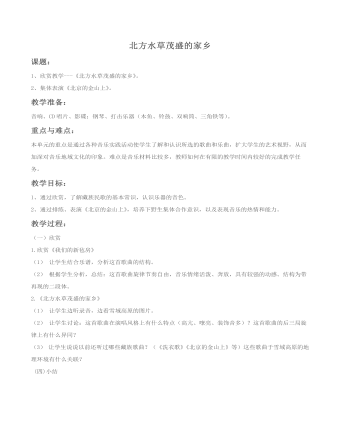
《北方水草茂盛的家乡》教案
课题:1、欣赏教学---《北方水草茂盛的家乡》。2、集体表演《北京的金山上》。重点与难点:本单元的重点是通过各种音乐实践活动使学生了解和认识所选的歌曲和乐曲,扩大学生的艺术视野,从而加深对音乐地域文化的印象。难点是音乐材料比较多,教师如何在有限的教学时间内较好的完成教学任务。教学目标:1、通过欣赏,了解藏族民歌的基本常识,认识乐器的音色。2、通过排练、表演《北京的金山上》,培养下野生集体合作意识,以及表现音乐的热情和能力。教学过程:(一)欣赏1.欣赏《我们的新毡房》(1) 让学生结合乐谱,分析这首歌曲的结构。(2) 根据学生分析,总结:这首歌曲旋律节奏自由,音乐情绪活泼、奔放,具有较强的动感。结构为带再现的二段体。2.《北方水草茂盛的家乡》(1) 让学生边听录音,边看雪域高原的图片。(2) 让学生讨论:这首歌曲在演唱风格上有什么特点(高亢、嘹亮、装饰音多)?这首歌曲的后三局旋律上有什么异同?(3) 让学生说说以前还听过哪些藏族歌曲?(《洗衣歌》《北京的金山上》等)这些歌曲于雪域高原的地理环境有什么关联? (四)小结
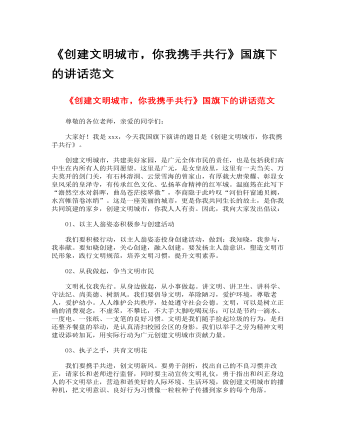
《创建文明城市,你我携手共行》国旗下的讲话范文
尊敬的各位老师,亲爱的同学们: 大家好!我是xxx,今天我国旗下演讲的题目是《创建文明城市,你我携手共行》。 创建文明城市,共建美好家园,是广元全体市民的责任,也是包括我们高中生在内所有人的共同愿望。这里是广元,是女皇故里,这里有一夫当关、万夫莫开的剑门关,有石林溶洞、云景雪海的曾家山,有厚载大唐荣耀、彰显女皇风采的皇泽寺,有传承红色文化、弘扬革命精神的红军城。温庭筠在此写下“澹然空水对斜晖,曲岛苍茫接翠微”,李商隐于此吟叹“河伯轩窗通贝阙,水宫帷箔卷冰绡”。这是一座美丽的城市,更是你我共同生长的故土,是你我共同筑建的家乡,创建文明城市,你我人人有责。因此,我向大家发出倡议: 01、以主人翁姿态积极参与创建活动 我们要积极行动,以主人翁姿态投身创建活动,做到:我知晓,我参与,我奉献。要知晓创建,关心创建,融入创建。要发扬主人翁意识,塑造文明市民形象,践行文明规范,培养文明习惯,提升文明素养。
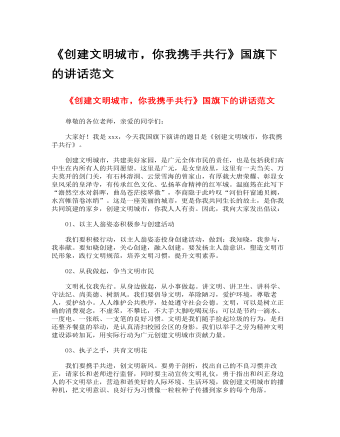
《创建文明城市,你我携手共行》国旗下的讲话范文
创建文明城市,共建美好家园,是广元全体市民的责任,也是包括我们高中生在内所有人的共同愿望。这里是广元,是女皇故里,这里有一夫当关、万夫莫开的剑门关,有石林溶洞、云景雪海的曾家山,有厚载大唐荣耀、彰显女皇风采的皇泽寺,有传承红色文化、弘扬革命精神的红军城。温庭筠在此写下“澹然空水对斜晖,曲岛苍茫接翠微”,李商隐于此吟叹“河伯轩窗通贝阙,水宫帷箔卷冰绡”。这是一座美丽的城市,更是你我共同生长的故土,是你我共同筑建的家乡,创建文明城市,你我人人有责。因此,我向大家发出倡议:01、以主人翁姿态积极参与创建活动我们要积极行动,以主人翁姿态投身创建活动,做到:我知晓,我参与,我奉献。要知晓创建,关心创建,融入创建。要发扬主人翁意识,塑造文明市民形象,践行文明规范,培养文明习惯,提升文明素养。
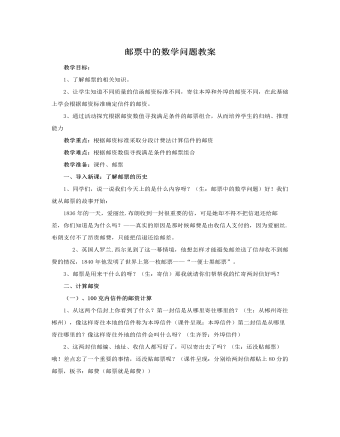
人教版新课标小学数学六年级下册邮票中的数学问题教案
《贴邮票》活动要求:A、每组4人,给四封不同地点、质量的信件B、根据信封上的信息计算邮费并按要求贴上邮票(邮票的总面值刚好等于邮费,不能多贴)每封信最多贴三张邮票,只有0.8元或1.2元的两种邮票纪律要求:看看哪组合作得最好,速度最快!如果遇到困难,在事发那个在一边最后再去解决。3、小组汇报(1)、贴邮票的过程中大家遇到了什么问题?(有的能贴有的不能贴)这样的信件有哪些?(告诉我地点、质量、邮费)(2)、其他的信件都能贴出来嘛?说说看你是怎么贴邮票的?(3)、请将你们贴好邮票的信件送到邮箱来。剩下的都是一些“难题”(4)、思考:为什么4.0元、4.8元、6元的邮费没有办法按要求贴出邮票?(5)、原因出在哪里?这个问题怎么解决?(邮票面值太小,将邮票的面值改大)(6)、那最少要改成多大的?为什么?(将邮票面值改大,你会从多大面值的邮票开始考虑?为什么?)
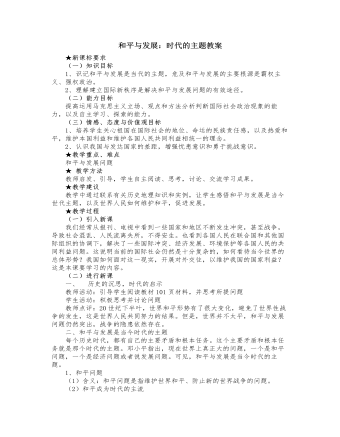
人教版高中政治必修2和平与发展:时代的主题教案
2、建立国际新秩序(1)建立国际新秩序是解决和平与发展问题的有效途径为了和平与发展,必须改变旧的国际秩序,建立以和平共处五项原则为基础的有利于世界和平与发展的国际新秩序。这是抑制霸权主义、强权政治,解决和平与发展问题的有效途径,是每个国家生存和发展的最基本和最重要的外部条件。教师活动:引导学生阅读教材103页“相关链接”材料,并思考所反映的问题学生活动:积极思考并讨论问题教师点评:世界发展的主体是世界各国人民。世界的管理必须由各国人民共同参与。这是各国人民的共同呼声。(2)国际政治经济新秩序的主要内容建立国际政治经济新秩序,就是要保障各国享有主权平等和内政不受干涉的权利,保障各国享有平等参与国际事务的权利,保障各国特别是广大发展中国家享有平等的发展权利,保障各个民族和各种文明共同发展的权利。
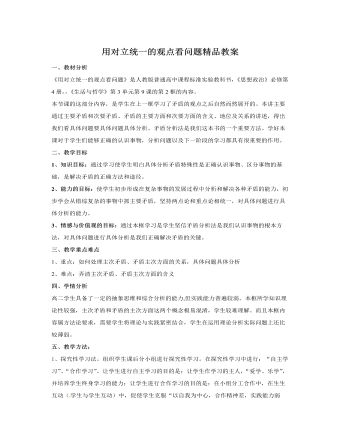
人教版高中政治必修4用对立统一的观点看问题精品教案
1、重点:如何处理主次矛盾、矛盾主次方面的关系,具体问题具体分析2、难点:弄清主次矛盾、矛盾主次方面的含义四、学情分析高二学生具备了一定的抽象思维和综合分析的能力,但实践能力普遍较弱。本框所学知识理论性较强,主次矛盾和矛盾的主次方面这两个概念极易混淆,学生较难理解。而且本框内容属方法论要求,需要学生将理论与实践紧密结合,学生在运用理论分析实际问题上还比较薄弱。五、教学方法:1、探究性学习法。组织学生课后分小组进行探究性学习。在探究性学习中进行:“自主学习”、“合作学习”。让学生进行自主学习的目的是:让学生作学习的主人,“爱学、乐学”,并培养学生终身学习的能力;让学生进行合作学习的目的是:在小组分工合作中,在生生互动( 学生与学生互动)中,促使学生克服“以自我为中心,合作精神差,实践能力弱“等不足,培养综合素质。2、理论联系实际法。关注生活,理论联系实际,学以致用。
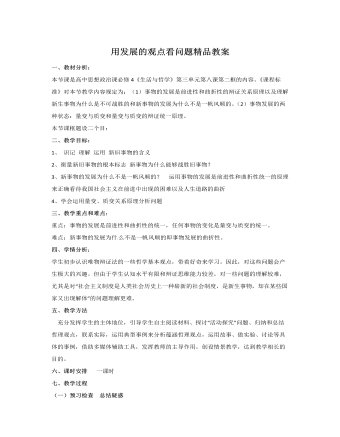
人教版高中政治必修4用发展的观点看问题精品教案
一、教材分析:本节课是高中思想政治课必修4《生活与哲学》第三单元第八课第二框的内容。《课程标准》对本节教学内容规定为:(1)事物的发展是前进性和曲折性的辩证关系原理以及理解新生事物为什么是不可战胜的和新事物的发展为什么不是一帆风顺的。(2)事物发展的两种状态:量变与质变和量变与质变的辩证统一原理。本节课框题设二个目:二、教学目标:1、 识记 理解 运用 新旧事物的含义2、衡量新旧事物的根本标志 新事物为什么能够战胜旧事物?3、新事物的发展为什么不是一帆风顺的? 运用事物的发展是前进性和曲折性统一的原理来正确看待我国社会主义在前进中出现的困难以及人生道路的曲折4、学会运用量变、质变关系原理分析问题三、教学重点和难点:重点:事物的发展是前进性和曲折性的统一,任何事物的变化是量变与质变的统一。难点:新事物的发展为什 么不是一帆风顺的即事物发展的曲折性。
